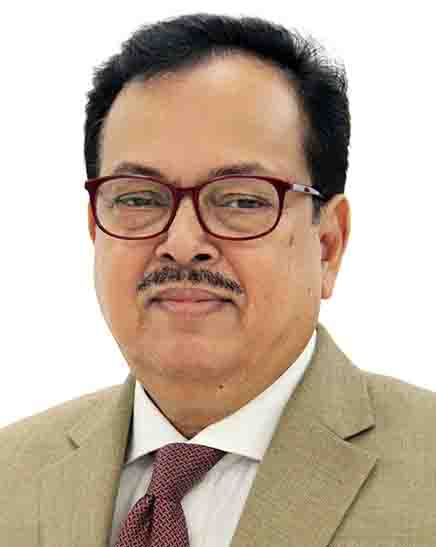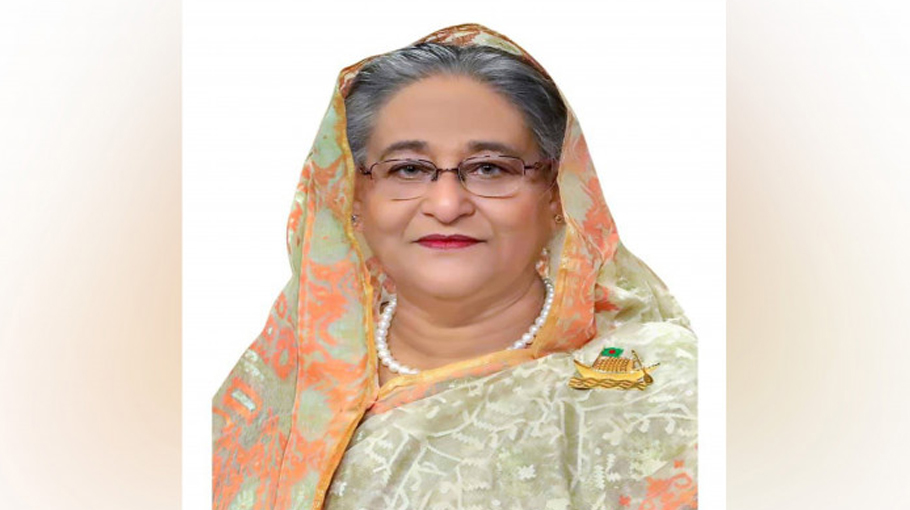Making Bangladesh great
Only Sheikh Hasina can do it

Bangladesh has made such a significant progress that did not happen in the last 40 years. Despite the devastating corona pandemic, the country has overcome most of the sinister hurdles and obstacles under the dynamic leadership of Prime Minister Sheikh Hasina.
Some people, who had been engaged in anti-liberation war, get united under the BNP banner and are now seriously active to undo the country’s development achieved by Prime Minister Sheikh Hasina.
Bangladesh is trying its best to meet successfully the new challenges of global inflation and economic crisis caused by the Ukraine war. Prime Minister Sheikh Hasina has given a call to the nation to brave the upcoming challenges by growing more food and maintaining austerity in all spheres of life.
On the other hand, the leaders and activists of BNP-Jamaat and their assigned team of criminals have long been waging propaganda against Bangladesh at home and abroad which lends credence to the fact that they don’t want country’s economic progress, peace and prosperity. What they want is power to create a Hawa Bhaban once again and make the country a failed state.
People have bitter experiences of countrywide political unrest and blockade to halt the economic progress initiated by Sheikh Hasina. They resorted to killing the innocent people by hurling petrol bombs at the running public transports to realize their selfish political ends.
The BNP –Jamaat men, who killed innocent people indiscriminately for their political gain can’t be trusted and can’t be voted to power again.
The government of Prime Minister Sheikh Hasina has been relentlessly trying its best to bring about a qualitative change in the life of the common man. The people have already started reaping positive results of the development work undertaken by the government of Sheikh Hasina. Country’s have-nots have got land of their own and the present government makes houses for them. About 35 lakh people who had nothing, have got the document of land and new house to live in. These men and women wish Sheikh Hasina a long life and run the country as long as she is alive.
Bangladesh is marching forward with non-stop progress under the leadership of Prime Minister Sheikh Hasina, the daughter of Father of the Nation Bangabandhu Sheikh Mujibur Rahman. Despite so many odds and obstacles such as devastating Coronavirus pandemic, Islamic extremism, the retrogressive-minded opposition parties and the defeated forces in the War of Liberation, the Prime Minister is indomitably going on with the development work. Overcoming all roadblocks, Sheikh Hasina keeps on moving ahead with the development programme including some mega projects taken up by her government which are near completion. She wants to make Bangladesh, economically prosperous, socially developed, and technologically advanced. With a view to bringing about qualitative change in the living standard of the people, special attention has been given to ensure the basic needs of the poor- the sine qua non for the alleviation of poverty.
The main obstacle to the path of development is poverty. When Sheikh Hasina took over as the Prime Minister in 2009, the poverty rate in Bangladesh was 41.5 percent.
She has succeeded in bringing down this rate to 20.5 percent in the last 12 and a half years by working tirelessly running the government for three consecutive terms.
However, if Bangladesh is to become a developed country, the poverty rate needs to further decline. The helpless marginalized people of the country need to be brought into the mainstream of development.
Through the ‘Ashrayan’ project, the PM is bringing the homeless and rootless people under the inclusive development.
She announced, “Not a single person in Bangladesh will remain homeless.”
In order to implement this directive of the PM, a list of such people was made in 64 districts of the country. This list is an ongoing process under the supervision of the Upazila Task Force Committee.
A list of 2 lakh 93 thousand 371 families of ‘A class’ i.e. completely landless and homeless was prepared. Moreover, 5 lakh 92 thousand 261 families belonging to 'B' category who have land but no house on it or have dilapidated and fragile houses have been listed.
Under the project, 4 lakh 42 thousand 608 homeless families have been rehabilitated till June 2021. All listed families will be rehabilitated in phases.
Father of the Nation Bangabandhu Sheikh Mujibur Rahman visited Char Poragachha village in the then Noakhali, now Laxmipur district's Ramgati upazila on 20 February, 1972 and rehabilitated river erosion victim families.
On 19 May 1997, a severe cyclone hit Cox's Bazar and other coastal areas. Prime Minister Sheikh Hasina visited St. Martin’s in Teknaf Upazila on May 20 and directed for rehabilitation of the homeless poor families hit by the cyclone. In the same year, the PM launched the Ashrayan project for the landless and homeless people.
Shelter means more than just accommodation; rather its scope is more extensive and wide. Beneficiaries received two percent of the land, getting a semi-pucca two-room houses. There is a free electricity connection and it has a bathroom, toilet and kitchen.
The land including the house has been jointly included in the deed in the name of both the husband and wife. Plenty of trees are being planted in the areas under the project. There is one tube well for every ten households for drinking water. As a result, the beneficiaries will be free from water- borne diseases including diarrhoea. Community clinics are being built for their health care. Primary school arrangements have been made to ensure primary education for the children living in the shelter.
There are playgrounds in the project area for exercise and entertainment of children and adolescents. The shelter project has all the civic amenities of a self-sufficient modern village.
Beneficiaries are being given various professional ten-day training to increase their capacity and efficiency. In particular, the beneficiaries living in the barracks are being trained in 32 occupations such as fish farming, carpet weaving, nursery, weaving, welding, electric wiring and rickshaw-bicycle-van repair.
During the training, they are given an allowance of Tk 750 per day so that their income is not disrupted. In the post-training period, the beneficiaries get loans of up to Tk 30,000 to start income generating businesses or vocations by forming cooperative societies.
The barracks are initially providing food assistance to the rehabilitated families under a three-month VGF. They are given priority in receiving benefits under maternity, old age, widow or other social security programs. In other words, a poor person is being established as self-reliant one by turning him into human resource in various processes.
Commenting on the poverty, Nobel laureate economist Amartya Sen said, "Failure to ensure access to food and other social benefits, i.e. ‘failure to ensure entitlement’, leads to hunger and poverty in the society."
The PM has made arrangements for other social benefits by bringing the beggars, widows, abandoned husbands, landless, homeless and rootless people under the use of land through the project for equitable distribution of wealth.
Climate refugees, minorities, third gender, Vedes, dalits, harijans and other backward communities have also been included in the program. It is the first and largest initiative in the world to build completely free housing to bring the backward people of the state into the mainstream.
Through the implementation of the project, an initiative was taken to provide basic materials to all the citizens mentioned in Article 15 of the Constitution.
According to Article 3.13 of the Bangladesh Awami League's 2018 Election Manifesto, poverty alleviation, reduction of inequality and the right to housing for all are being ensured.
The PM’s promise to rehabilitate the environment and climate refugees has been fulfilled. As per the Sustainable Development Goals (SDGs), its No.1 goal is poverty alleviation, No.2 is hunger eradication, No.3 is health care, No.4 is quality education, No.5 is gender equality and women's empowerment, No. 6 is drinking water and sanitation, No. 8 is adequate employment, No. 10 reducing inequality and No. 11 sustainable and safe settlements.
Different ideas were introduced at different times to alleviate hunger and poverty. Exploitation and deprivation in the name of foreign aid, food aid, relief, and micro-credit put people in extreme poverty.
Danny Roderick, a professor of political economy at Harvard University in the United States, has done research on high growth in East Asia, where land redistribution serves as an important condition for achieving high growth.
Through the Ashrayan project, the beneficiaries get ownership of land including houses and become self-reliant by engaging in income generating activities. Beneficiaries could dream of overcoming inferiority and making a decent living. In this way, the PM is involving the marginalized people in inclusive development.
The project is playing an important role in alleviating poverty in Bangladesh. This new approach to inclusive development and poverty alleviation is already known as the “Sheikh Hasina Model”.
The six main features of 'Sheikh Hasina Model' are as follows-
1. To become financially self-sufficient by increasing earning capacity and savings
2. Restoration of dignified livelihood and social status
3. Women's empowerment with half ownership of homes
4. Human resource development by enhancing skills and competencies through training
5. Extensive afforestation and tree planting to improve the environment
6. To ensure the facilities of the city in the village.
The main philosophy of Bangabandhu Sheikh Mujib's politics was to put smiles on the faces of dejected people. The eldest daughter of the father of the nation is working day and night to fulfil that goal.
She has arranged all the development plans keeping in view the principle: Not a single person can be left out.
Bangladesh has already received the final recommendation of the United Nations to become a developing country. The country is gradually moving towards Bangabandhu's lifelong cherished dream of a poverty-free 'Sonar Bangla’.
It is hoped that if this trend of development continues, Bangladesh will become a developed and prosperous country before 2041 under the able and visionary leadership of Prime Minister Sheikh Hasina.
Sharif Shahab Uddin is Editor-in-Chief, Bangladesh Post.



